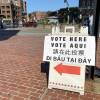Voters across Massachusetts will head to the polls today, and some will have their first encounter with certain candidates’ names as they bubble in their ballots.
In many of the contested statewide races, it’s unclear who voters will pick to move on to the November general election. Part of the uncertainty, according to recent polling, is that large swaths of the electorate feel they don’t have the information they need to make that choice.
While Republicans will choose their nominees for governor and lieutenant governor during the primary, most of the races are on the Democratic side.
Voters who pull a Democratic ballot have choices for lieutenant governor, attorney general, auditor and secretary of state. In three of those races, more than half of likely voters surveyed from Aug. 19-21 said they didn’t have enough information to decide. And in the attorney general race, 49% said they lacked the information to decide on a candidate.
“What we really take away from these findings is that democracy is failing to do the job that it has to do in this election, which is give voters the information they need to to make choices about who’s going to be governing them,” said John Griffin, policy advisor to the organization that sponsored the poll, Priorities for Progress. “They can’t really see the landscape, and they can't see in such a way where they can shape their own government.”
The poll, conducted by The MassINC Polling group , found half of voters were undecided in the Democratic lieutenant governor race among Rep. Tami Gouveia, Sen. Eric Lesser and Salem Mayor Kim Driscoll. Eighty percent said they'd never heard of Gouveia, while 65% said the same of Lesser and 55% of Driscoll.
Respondents were similarly unfamiliar with auditor candidates Chris Dempsey and Diana DiZoglio — 76% said they'd never heard of DiZoglio and 65% hadn't heard of Dempsey.
The only incumbent with a primary challenge this year is longtime Secretary of State Bill Galvin, who's held that role since 1995. According to the poll, 30% of likely voters had never heard of him, and 70% did not know his opponent, Tanisha Sullivan.
Other recent polls also indicate voter uncertainty. A UMass Lowell poll out last week found nearly a quarter of likely Democratic primary voters undecided on multiple counts, leading John Cluverius of the school's Center for Public Opinion to declare the turnout picture "as hazy as apple cider." A UMass Amherst/WCVB poll found the auditors and attorney general races too close to call .
Griffin, of Priorities for Progress, said his group’s findings shouldn’t be read as a sign that voters don’t care. He said there is a lot of energy among voters, but it’s mostly focused on the top of the ticket rather than the down-ballot contests for open statewide seats — positions the winners could hold for years or use as a springboard for higher political aspirations.
“Really, these are the races that are going to shape the commonwealth for the next decades,” he said. “When you have a situation where those are the stakes but where voters say that they don’t have information to know who to vote for, where all of the non-incumbent candidates have failed to reach more than a quarter of voters, you really have to ask yourself what we’re doing wrong as people who care deeply about politics and policy in Massachusetts.”
Griffin and Harvard professor Danielle Allen, a one-time 2022 gubernatorial candidate, both say more news coverage focused on down-ballot races could help.
"Healthy democracy requires fair electoral contests, but shrinking news coverage of state races means money in politics plays an ever bigger role,” Allen said. “Voters deserve real voice and choice and for that we need re-investment in vibrant local journalism."
Allen, a Democrat, dropped out of the race for governor in February, saying stringent ballot-access rules in Massachusetts push out non-traditional candidates and deprive voters of choice.
Secretary of State Galvin projected around 1.1 million voters could cast ballots in the primary, counting those who will vote today and those who voted early either by mail or in-person. That would represent turnout of around 23% of the state’s registered voters.
As of Thursday, more than 340,000 people had returned mail-in ballots and another roughly 31,000 had voted in-person, Galvin said.
But those who commit well in advance to a particular candidate can face their own headaches. Democrat Quentin Palfrey ended his campaign for attorney general last Tuesday, and anyone who’d already voted for him will not get a re-do.
Palfrey’s withdrawal set up a two-woman contest between AG hopefuls Shannon Liss-Riordan and Andrea Campbell. The MassINC poll was fielded with Palfrey still in the race, and it found 32% of voters undecided among the three candidates.
Campbell and Liss-Riordan each seem to be making some impression on voters, the poll shows. Campbell had the highest favorability ratings among any candidate who doesn't already hold statewide office, at 33%. Liss-Riordan's campaign was the one the most voters — 40% — had heard from via ads or mailers.








